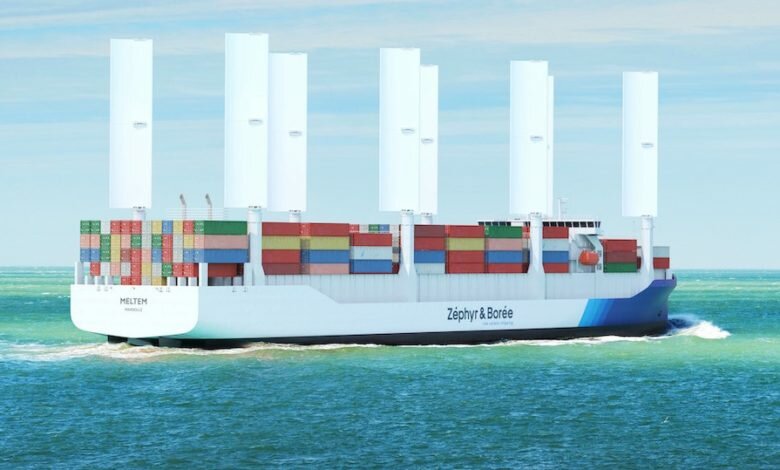 (Credit: Zéphyr & Borée)
(Credit: Zéphyr & Borée)French maritime transport company Zéphyr & Borée has received an Approval in Principle for its 1,800-TEU container ship equipped with a wind-assisted propulsion system, demonstrating the feasibility of using wind-propelled wing-sails on this type of vessel.
The system is assisted by eight computerized wing sails that can be steered to catch port and starboard winds and adjust themselves automatically depending on wind conditions to ensure optimal savings. The ship also has shaft generators and a heat recovery system that further reduce fuel consumption.
Certification services provider Bureau Veritas, who guided the vessel’s design from an early stage, has released classification rules that provide a framework for wind propulsion systems. To comply with the rules, ships must undergo a risk analysis, determine local and general ship strength, define load cases, automation and release systems, and fulfill maintenance requirements.
BV executive Laurent Leblanc acknowledged that while wind “is not always available,” it remains “a serious option to help decarbonize the shipping industry,” noting that, “With this AiP, we are pleased to demonstrate the technology can be applied to containerships, which represent 17.5% of the global fleet (in tonnage).”
Zéphyr & Borée CEO Nils Joyeux similarly stated that “wind energy will play an important role in the years to come to decarbonize ships’ propulsion,” adding that the company intends to continue developing “wind propulsion solutions that are economically viable and make a tangible difference for the sector.”
To this end, it is currently building its Canopée cargo ship: the world's first sailing cargo ship with four wing sails that will reduce emissions by an estimated 35%.
Taking advantage of an ancient technology and retooling it for the modern world, incorporating sails onto shipping vessels is one strategy to increase energy efficiency and reduce greenhouse gas emissions. In the race to decarbonize their fleets, shipowners are also employing hydrogen fueling and carbon-neutral methanol.
However, the shipping industry recently stated that it can only do so much on its own. In September, the Getting to Zero coalition, comprising 140 shipping leaders from 32 different maritime nations, called on governments to help the industry achieve carbon neutrality by 2050 via clear targets and supportive policies and investments.